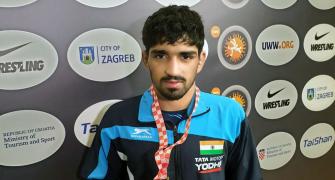



Lieutenant General (retired) Kirpal Singh Randhawa, commissioned into the 7th Light Cavalry in 1952, headed a team of Indian Army officers that trained Iraqi officers in the 1970s. The training was part of a bilateral military agreement. Among those he trained was Iraq's present Defence Minister General Sultan Hashim Ahmad.
Hashim's proximity to Saddam Hussein enabled General Randhawa to visit Iraq several times in the last 25 years.  He first visited Iraq in 1977 and remained there till 1979, and subsequently made one more trip to the country as a serving officer.
He first visited Iraq in 1977 and remained there till 1979, and subsequently made one more trip to the country as a serving officer.
In an exclusive interview with Chief Correspondents Onkar Singh and Josy Joseph, General Randhawa said everything was legitimate in a war when soldiers were killing each other. The officer who commanded the Indian Army's elite 1st Armoured Division before retiring in 1990 also said it would be naïve to assume that Saddam does not have chemical and biological weapons.
American and British generals are making tall claims about the gains made in the battle by the coalition forces. They even said the war would be over in a few weeks. Do you believe them?
I would not like to limit myself to the battle that is going on in Iraq right now. It is a well known fact that seasoned commanders do long term and short term planning. The Americans have been taken in by the fact that they had a very easy run in the 1991 Gulf War. They thought they could repeat it this time around as well. There is a long story as to why the Iraqis went down in 1991. Perhaps based on their earlier experience, the Americans told the people this would be a decisive and short war with minimum casualties to civilians and US troops. But this is not going to happen.
What is the difference between the Iraqi army strategy in 1991 and now?
The difference is the Iraqis had good equipment basically armoured which means tanks, air defence systems etc. They made two major errors. The first error is attributed to the high command -- once they had attacked Kuwait and their purpose of hitting the Kuwaitis on the head was achieved, they should have come back. Like what the Chinese did to us in 1962. They hit us on our head and went back.
But they [Iraqis] did not do that. They were persuaded by friends like me and at a much higher level, by the Russians. The orders of the withdrawal came all of a sudden. The Iraqis were in a hurry to get back home but they were exposed to fire from the air. They suffered very heavy losses. Intervention by the United Nations brought the hostilities to an end.
What strategy are Saddam Hussein and his officers adopting now to keep the enemy away from capturing Baghdad?
Iraq has three armoured divisions. Each division has 10,000 troops, 150 to 200 tanks, 50 to 60 pieces of artillery, armoured personnel carriers and so on. Besides sending sub units to soup up their paramilitary forces all the armoured divisions are within the vicinity of Baghdad. All these divisions are totally intact.
Then Iraq has a mechanised division that has some tanks, some armoured personnel carriers, troops and other vehicles. In addition to that they have two infantry divisions. What you are seeing is what the Indian Army and British Army call -- covering troops. They are the ones who first meet the enemy when he crosses the border. They are lightly equipped, their main aim is to delay the enemy advance and move back. They are not meant to fight to the last man, to the last round.
As the allied forces reach near Baghdad, the fight is going to get stiffer and it will become much more difficult to achieve the task. Once they get near Baghdad, the Iraqis will certainly use their armoured division and stage two would be urban warfare like Stalingrad or Berlin.
The Americans have described the suicide attacks as illegitimate and against the Geneva Convention.
In war when you are killing each other there is no such thing as legitimate and illegitimate. I come from an educated, Westernised family. Let us for a moment pause and ask whether the American bombing of Hiroshima and Nagasaki was legitimate? You cannot have two yardsticks. What you do is legitimate and what others do it illegitimate. That man (the suicide bomber) is a devoted soldier and he is prepared to give his life for his country.
When the Americans attack they call it a target of opportunity.
This is how they put it. But I would say there are some things that you do not do. If a soldier puts his hands up, you take him prisoner, give him food and clothing and give him protection but you do not shoot him. That is a different thing. But till the time you are fighting there is nothing illegitimate. Under international conventions, the use of chemical and biological warfare is forbidden. To the best of my knowledge Iraq has so far not indulged in these.
Does Iraq have the capability of having chemical and biological weapons?
I would not be able to say categorically whether they have it or not. I have known Iraqi soldiers and officers like no one else. It would be naive on anyone's part to think that the Iraqis would not have these weapons. They are bound to have them but I think they have been sensible enough not to use them. Unless they are pushed to the wall and are left with no choice.
Americans say the fact their forces found chemical suits indicates that Iraq has chemical and biological weapons.
A chemical suit is protective equipment to save yourself from gas. In World War I when gas was used hundreds and thousands of chemical suits were around. Having a chemical suit does not mean you are going to attack with chemical weapons. It could also mean when the Americans attack with chemical weapons they should not be left wanting. A chemical suit is always kept for your protection. If you have the chemical ability and you want to use the weapon then you use the chemical suit to save yourself.
How long will this war last?
It is a difficult question to answer. I would put it the other way round. We went to Pakistan on September 6, 1965, thanks to Lal Bahadur Shastri, then the prime minister of India. I remember The Times of India ran a headline on September 8, 1965: 'Jawans on the outskirts of Lahore.'
The day the ceasefire took place the jawans were still on the outskirts of Lahore. These kinds of claims are premature. Umm Qasar has just been secured. Basra has not been secured as yet. Nasiriyah is far from being captured leave alone being secured. Bitter fighting is going on near Najaf.
One important factor that has played a crucial role is Turkey. It did not allow American forces to use its land to mount an assault on Iraq. All these troops had to be moved to the south. On that side, all you had was US Airborne Brigade 173. They first throw pathfinders or paratroopers. Then helicopters land with light weapons, then you create an airfield. You first secure the airfield and then slowly build up troops. That brigade is not sufficient to mount an assault on Baghdad from the north.
But they have already secured an airfield in the north.
Securing the airfield has no meaning. The question is where do you go after that. You need tanks, you need armoured personnel carriers. You need long range artillery. You need logistical supplies -- both ammunition and food etc. There is a limit to how much you can throw. May I take you back to the Vietnam war? In the famous battle of Dien Bien Phu, the French carried out the assault deep inside enemy lines. But ultimately they could not sustain it and the Vietnamese got better of the French army.
After being bombed for 12 days in a row, how much of the Iraqi fighting capability is still intact?
There is no doubt that the fighting capability certainly gets degraded after this kind of bombing. But this time around, the Iraqis are fully prepared to meet the challenge. I had an officer of the Iraqi armoured division here in New Delhi. He left three days before the hostilities began. Every house has been given six months' rations. Whoever can afford has been told to dig a tube well and the government has paid 50 per cent of the total cost. So every fourth house in Baghdad has its own tube well.
Americans are short of water in Basra but Iraqis will never be short of water in Baghdad. This is the degree of their preparations. This goes to show how long they are mentally and physically prepared to last.
Will the Americans survive the hot summer of Iraq?
There is no choice.
What is Saddam looking for? What is going to be his strategy?
What Saddam is looking for is his honour, revenge and prestige. He will never give up. He will never surrender. If need be he would die like Hitler in a bunker. He would want to inflict maximum casualties on the American-led coalition forces. Every single bodybag that America, its President and senior officers receive is going to damage the morale of the American people. If you ask an average American to pinpoint Iraq on the world map, he will not be able to do so, leave alone telling you where Basra or Baghdad is.
The question they are asking is why should their sons go to a foreign land, which has not thrown one shell on his or her house and get killed for nothing. The resistance to Bush will increase in coming days. He has his problems. Saddam is hoping that world opinion will change in his favour and people will look at the war in the same manner as he does. This is already happening. The Arab world has got together and they have made it clear that they do not subscribe to this war. The French have taken an open stand for whatever reasons. More and more people are coming out in favour of Saddam Hussein against America.
Photograph of Iraqi people in Baghdad: Oleg Nikishin/Getty Images








